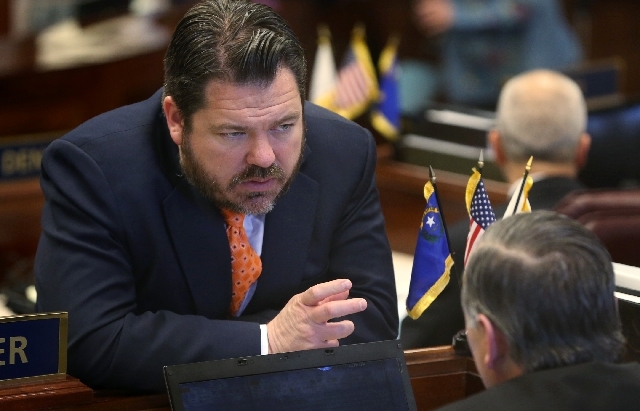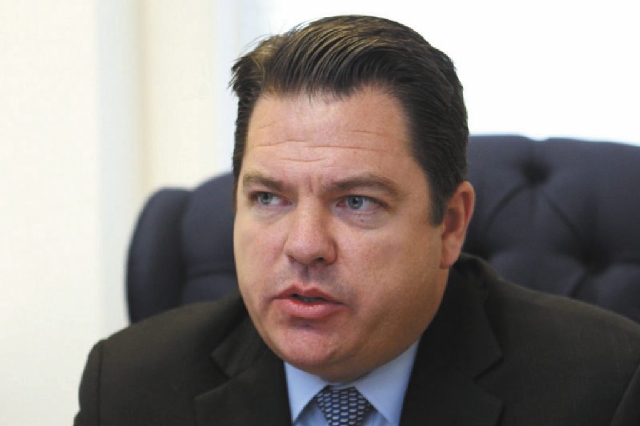Nevada GOP senators offer initiative to tax mining for school funding


CARSON CITY — Senate Republicans on Wednesday announced their Education Priority Initiative to tax gold and silver mining to fund education, a counter to the teacher-backed margins tax that will be on the ballot in 2014.
The new initiative is supported by GOP Sens. Michael Roberson, Ben Kieckhefer, Joe Hardy, Greg Brower, Scott Hammond and Mark Hutchison.
The initiative would generate more than $300 million per year to cut class sizes by hiring thousands of new teachers, develop and fund English language learner programs, and establish an education stabilization fund. It would set a
10 percent net proceeds tax on gold and silver mining revenue. Local governments would get net-proceeds tax revenue at current levels.
Roberson has his work cut out for him if he is to pass an alternative ballot proposal in the Democrat-dominated Legislature and avoid a nearly certain veto by Republican Gov. Brian Sandoval. Sandoval.
His press secretary, Mary-Sarah Kinner, said Wednesday he was absolutely opposed to the plan.
The Senate Republicans would need support of at least two-thirds in both houses to override a veto.
Senate Majority Leader Mo Denis and Revenue Committee Chairman Ruben Kihuen, both D-Las Vegas, said they will consider the proposal but want to find revenue now to fund education.
“We aren’t ruling out anything now,” Kihuen said. “A few of us have been meeting with Sen. Roberson, and this will be discussed.”
“We have to look at everything,” Denis added. “The Roberson plan … I want to look at it. It is great to get ideas out there.”
But Denis reiterated that his goal is to secure revenue needed to fund public education properly now, not two years from now, as would happen under Roberson’s mining tax plan.
“Why don’t we do our job now?” he asked. “We can’t wait another two years or 10 years to fund education.”
The Senate Republicans might have more problems getting support from Republican colleagues in the Assembly.
“Members of the Assembly Republican Caucus, many of whom represent areas of the state where mining is a vital partner in their local communities, are not as anxious to single out the mining industry while Nevada’s economy is still trying to recover,” said Assembly Minority Leader Pat Hickey, R-Reno.
Roberson predicted the opposition will come around to his thinking in May, when the Legislature starts to look at the revenues it needs and finds other options are less popular or unwise.
“I think folks in this building are becoming more open-minded,” he said. “When we get close to the end of the session, this is going to look better and better. I am confident it will happen.”
Assembly Taxation Committee Chairwoman Irene Bustamante Adams, D-Las Vegas, said she would not take a position on Roberson’s plan until she sees a bill, but she said she would not be surprised if it comes up in negotiations at session’s end.
But Tim Crowley, president of the Nevada Mining Association, called it a grab for headlines and a “political stunt” as the industry works with Sandoval and the Legislature on thoughtful tax policy.
“The Roberson tax would kill investment in mining ventures, adversely impact business relationships between mines and the 2,300 Nevada companies that serve the mining industry, and ultimately eliminate some of the best jobs in the state,” he said.
In announcing the plan, Roberson said large class sizes must be reduced to improve learning.
“In Clark County, both the school district and teachers have agreed on a long-term class-size reduction plan to hire 4,000 teachers over the next four years,’’ he said. “We will fund the plan with the passage of the Education Priority Initiative.”
The Senate Republicans said they support Sandoval’s proposed budget, which includes more money for all-day kindergarten and English Language Learners.
“However, we believe the Education Priority Initiative is critical to improving educational opportunities for all Nevada children,” Brower said.
Hammond said the teacher-backed margins tax of 2 percent on companies with annual gross revenues exceeding
$1 million is the wrong approach.
“The margins tax is a job-destroying tax that will force businesses to close and drive jobs out of Nevada, and it fails to ensure that more revenue actually goes to the classroom,” he said. “On the other hand, the Education Priority Initiative will bring more equity to the current tax structure.”
The GOP plan has been questioned by the secretary of state’s office, which issued a legal opinion saying that because lawmakers did not specifically reject a Nevada State Education Association petition for a margins tax, they cannot offer voters an alternative. Republicans counter with a Legislative Counsel Bureau legal opinion clearing their plan.
If successful, the Republican tax plan would be on the 2014 ballot in competition with the margins tax. Both would make new tax revenue available in 2015.












